Two Discoveries, One Powerful Reminder – It Started with the Pony Express…
January 26, 2026 by GuyHeilenman · Leave a Comment
From the very beginning, a recurring theme on the History’s Newsstand blog has been the joy of finding hidden gems—those golden nuggets tucked within historic newspapers. Collectors of rare and early papers know this thrill well: you acquire an issue for one reason, only to uncover something unexpected that proves equally—if not more—captivating.
That’s exactly what happened to me recently while examining the April 16, 1860 issue of The Evening Post (New York). My original goal was to locate coverage of the completion of the first run of the Pony Express, and to my delight, I found not one but two front-page reports. Front-page coverage of such events is rare enough—but two related pieces? A true collector’s treat.
As I continued browsing for additional Pony Express material within the issue, I stumbled upon one of those unforgettable “hidden gems”: a printed exchange between a runaway slave and his former master. While not an account of a major historical event, few subjects evoke as much emotion as slavery, and reading such raw, personal correspondence in a period newspaper was deeply moving.
While the issue’s collectible value is likely anchored by its Pony Express reports, it’s this second discovery that continues to resonate with me. It serves as a poignant reminder—to me, my family, and my friends—of the immeasurable worth of every human being. Each of us, created in God’s image, carries equal and sacred value. Red and yellow, black and white—we are all precious in His sight.
All right, I’ll step down from my soapbox now. The photos below provide context for the discoveries mentioned above. Thanks for reading—and for sharing in the joy of finding history’s hidden treasures.
One of the Two Reports regarding the Pony Express
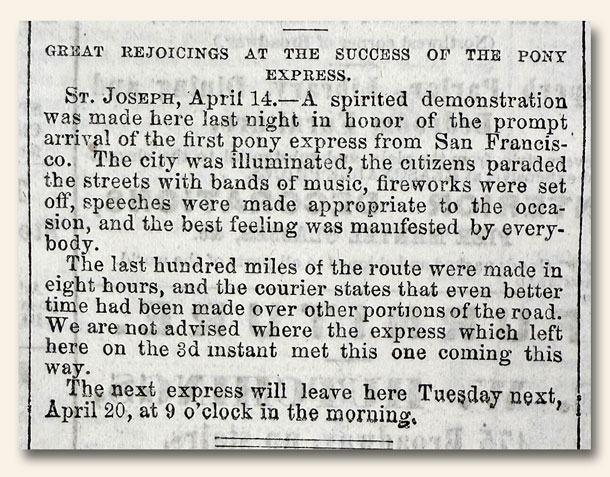
Correspondence Between the Runaway Slave and his former “Master”
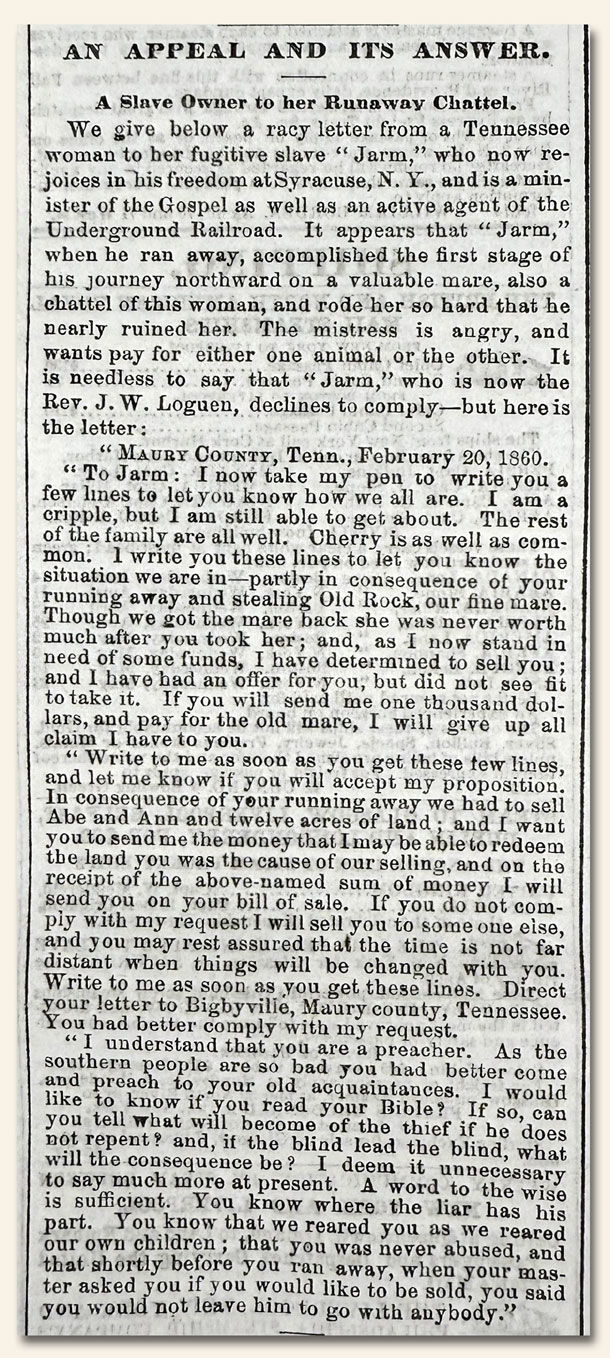

1776-2026: The Dream Still Shines at Dawn’s Early Light!
January 5, 2026 by GuyHeilenman · Leave a Comment
Whether we call it the Semiquincentennial, America250, the Quarter Millennial, the Sestercentennial, or simply the 250th birthday of the boldest experiment in self-government, 2026 rises like a new dawn—filled with promise, reflection, and hope for every American and every friend of liberty across the world.
The front page below, taken from a newspaper celebrating the Centennial Fourth of July in 1876, carries us back to that earlier moment of celebration—a time when a young nation looked proudly to its past and eagerly toward its future. It reminds us of the countless generations whose courage and sacrifices made possible Franklin D. Roosevelt’s enduring truth:
“We are a nation of many nationalities, many races, many religions—bound together by a single unity, the unity of freedom and equality.”
That vision still lights our way. Yet we are also called to remember Frederick Douglass’s wise and urgent reminder, spoken on the 23rd anniversary of emancipation in the District of Columbia:
“The life of the nation is secure only while the nation is honest, truthful and virtuous.”
As we celebrate this extraordinary milestone, may we lift our hearts in gratitude for the Divine grace that has guided us through triumph and trial alike. And as we look ahead, may we renew our shared promise—to preserve every hard-won freedom and to keep lifting the banner of justice, opportunity, and dignity for all who call this land home.
Here’s to the journey still unfolding. Here’s to the dream still alive.
Happy 250th, America!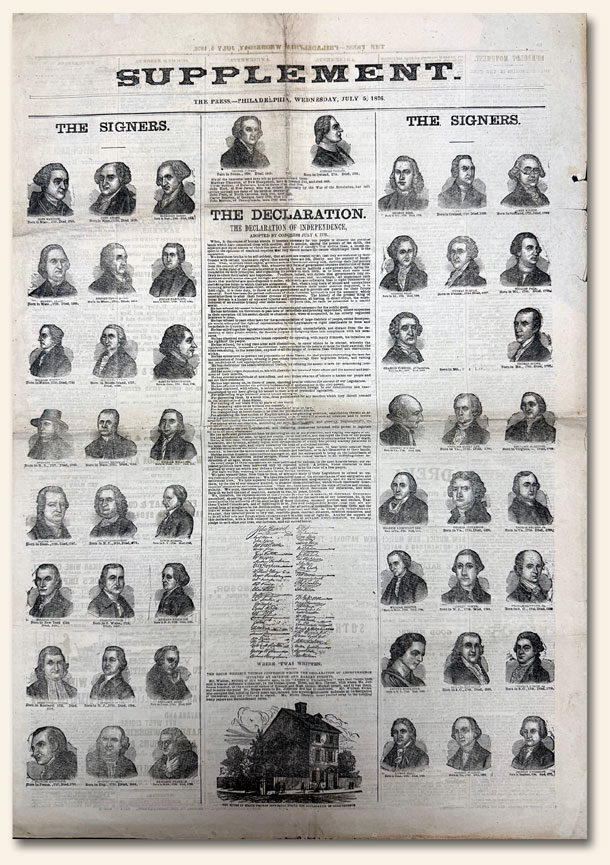
Christmas through the eyes of a newspaper from 1794…
December 25, 2025 by GuyHeilenman · Leave a Comment
As I was searching through our newspapers published on Christmas from the past in the hopes of finding one which would be potentially meaningful to our collecting friends, I came across a December 25, 1794 London Gazette which seemed to hit the mark. I’d love to know if you agree.
Under the heading “AMERICA” on page three I found the entire text of President George Washington’s State of the Union address. It is quite lengthy, and the entire text can be found online, but I was struck by the first and last paragraph – both of which are shown below. Is it me, or could these words have been penned today? Merry Christmas!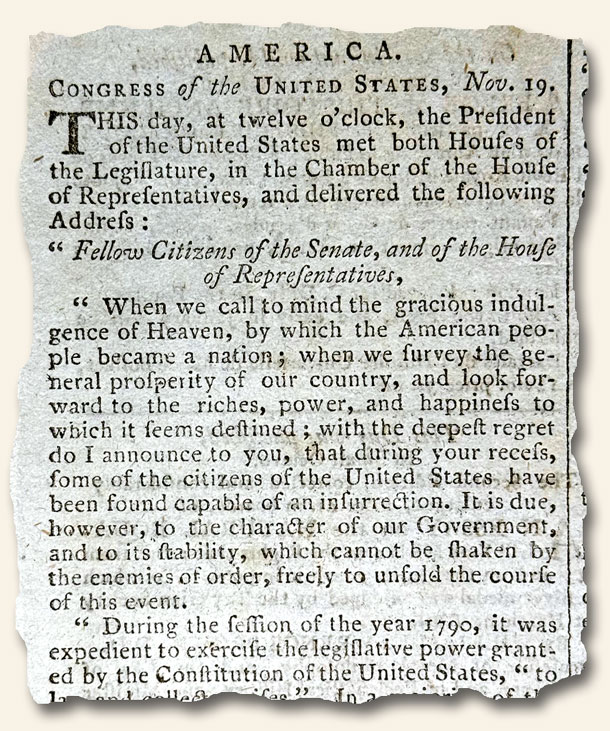
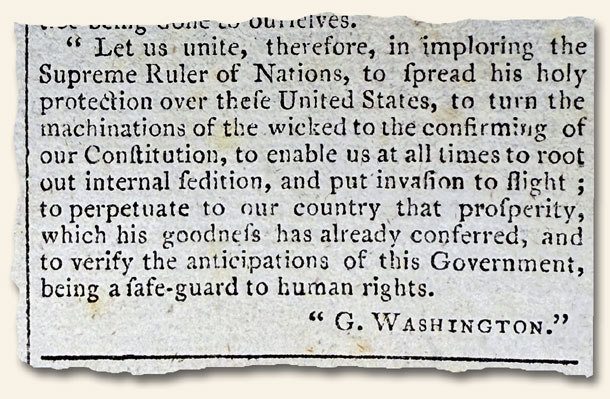
Publishing Under Fire: The Nippon Fijii and the Aftermath of Pearl Harbor…
December 8, 2025 by GuyHeilenman · Leave a Comment
It’s difficult to fathom what it must have been like to be a Japanese-American living in Hawaii at the time of the Pearl Harbor attack. According to the 1940 census, more than 150,000 Japanese-Americans—roughly 35% of Hawaii’s population—suddenly found themselves in an impossible position, caught between loyalty to their home and suspicion from their neighbors.
Fear quickly swept through the islands. While the sheer size of the Japanese-American community made mass internment in Hawaii unfeasible, more than 2,000 individuals were arrested, many later sent to internment camps on the mainland. Their lives—and their trust in the nation they called home—were forever changed.
It was in the midst of this uncertainty and fear that the staff of NIPPON FIJI, Hawaii’s leading Japanese-language newspaper, produced their December 8, 1941 issue. The paper stands today as one of the most striking and rare firsthand publications from that dark and defining moment in American history.
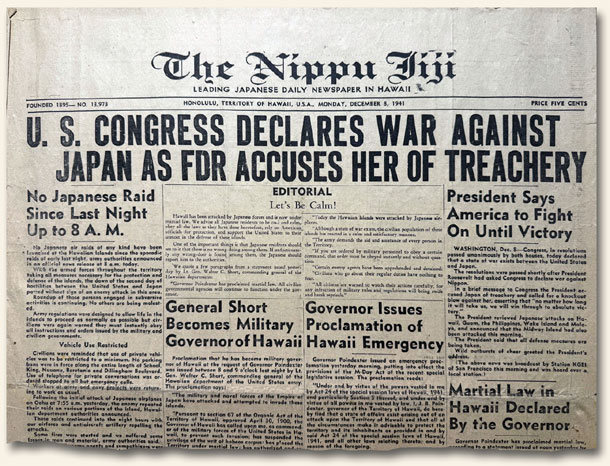
Properly Directed Thankfulness – George Washington and the Foundations of a New Nation…
November 25, 2025 by GuyHeilenman · Leave a Comment
On October 3, 1789, just months into his presidency, George Washington issued the very first official presidential proclamation. Fittingly, his choice of subject set the tone for a new nation: a call for a national day of thanksgiving and prayer. In it, Washington urged the people of the United States to acknowledge “with grateful hearts the many signal favors of Almighty God, especially by affording them an opportunity peaceably to establish a form of government for their safety and happiness.” This was more than a holiday declaration—it was a reminder that gratitude, humility, and faith would form part of the nation’s foundation.
Below is the complete text of Washington’s Thanksgiving Proclamation as it appeared on the front page of the Gazette of the United States on October 7, 1789:

They Put It In Print – A U.S. President Seeks Permission…
October 27, 2025 by GuyHeilenman · Leave a Comment
In the U.S., only Congress can declare war. So how many wars have Americans actually fought since World War II? You might think of the Korean War, Vietnam, Kuwait, Iraq, or Afghanistan. But here’s the catch: the answer is technically zero.
How can that be? Modern presidents simply avoid the word “war,” using terms like “military engagement” or “conflict” instead. No official declaration, no congressional vote—problem solved.
It wasn’t always this way. Take the War of 1812: President James Madison believed the U.S. needed to go to war with Great Britain. Did he send troops under a euphemism like “military operation”? No. He went straight to Congress with a detailed manifesto explaining why war was necessary. That document, printed in The War on June 27, 1812, shows just how seriously Madison took the Constitution’s war powers. The introduction and conclusion of his lengthy plea are shown below.
Today, renaming wars might serve convenience or strategy, but it raises a bigger question: if we can call war by any name we like, what happens to the checks and balances the Constitution set in place?
Do you think this trend is a necessary evolution—or a dangerous bypass of Congress?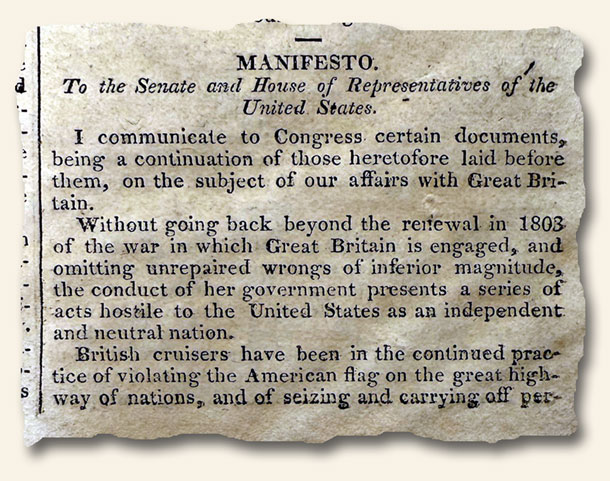
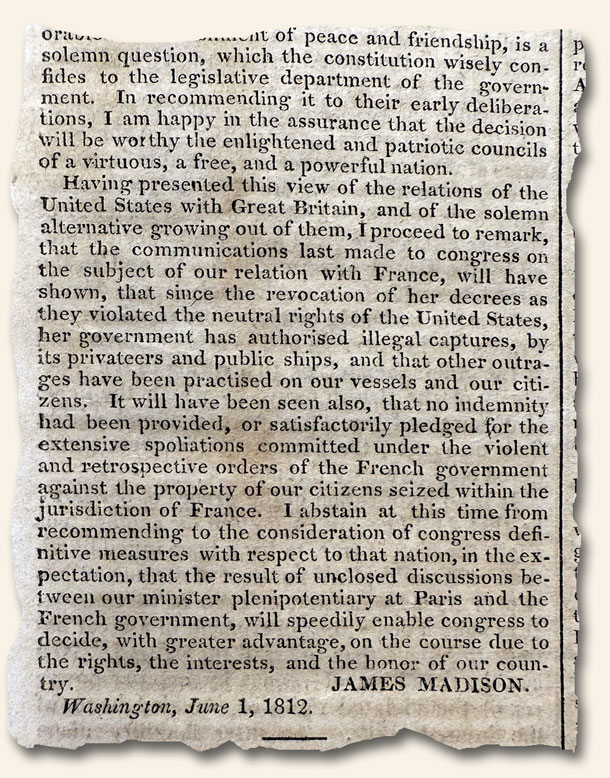
Headlines That Never Happened: Germany’s Loss and Its Lasting Echoes…
October 20, 2025 by GuyHeilenman · Leave a Comment
In April of 1918, a newspaper playfully speculated on what the headlines might have looked like if Germany had won World War I. A century later, we know the opposite outcome set in motion consequences far greater than most could have imagined. Germany’s defeat, and the way the Allies handled it, reshaped not just Europe but the modern world.
 The Ripple Effects of Germany’s World War I Defeat
The Ripple Effects of Germany’s World War I Defeat
The Treaty of Versailles (1919) imposed heavy reparations, territorial losses, and strict military limits on Germany. Instead of securing peace, these terms humiliated the nation and destabilized its young democracy. The resentment they bred became fertile ground for Adolf Hitler and the Nazi Party, leading to World War II and the Holocaust.
Europe’s New Order
Britain and France emerged victorious but weakened, while the United States stepped into global leadership. Versailles became a cautionary tale: punish a nation too harshly, and you may guarantee the next war. After World War II, the Allies took the opposite approach—rebuilding Germany through the Marshall Plan and anchoring it in NATO and the European Union. Today, Germany’s central role in both reflects that strategy.
Jews and the Holocaust
Germany’s turmoil fueled dangerous scapegoating. Conspiracy theories like the “stab-in-the-back” myth cast Jews as traitors, intensifying antisemitism that Nazi propaganda later weaponized. The Holocaust destroyed European Jewry and gave new urgency to the Zionist movement, leading to the founding of Israel in 1948.
Redrawing the Middle East
The collapse of Germany’s ally, the Ottoman Empire, allowed Britain and France to carve up the Middle East. Mandates in Iraq, Syria, and Palestine ignored ethnic and religious realities. Britain’s contradictory promises to Jews and Arabs in Palestine set the stage for the enduring Israeli-Palestinian conflict.
Lasting Echoes
The “war to end all wars” did not end conflict—it reshaped it. From NATO and the EU to Israel’s creation and Middle Eastern instability, the ripple effects of Germany’s defeat still define our world.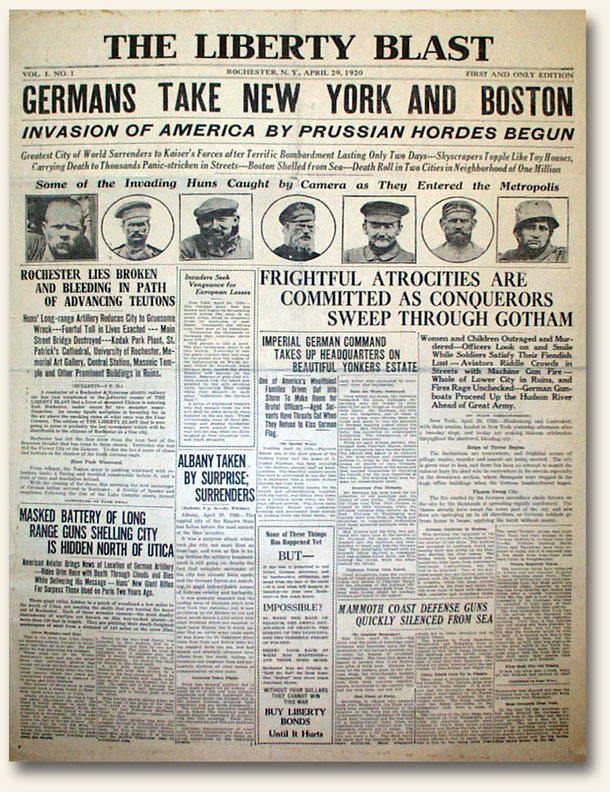
While the two photos above show The Liberty Blast with a dateline of April 29, 1920, this newspaper with “fictious reporting” was actually printed on April 20, 1918 “in the hope that in some small way it may serve to awaken in the hearts & minds of those who read it a realization of those horrors of a great world war, so far from and yet to near to American shores, American life, and American people…”.
Snapshot 1866 – Slavery: A Wound on the Soul of a Nation…
August 25, 2025 by GuyHeilenman · 1 Comment
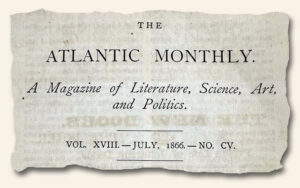 Few institutions in human history have inflicted more suffering or revealed deeper moral failings than slavery. Its cruelty was evident to many, even in its own time, and voices of conscience spoke out with clarity and passion against it.
Few institutions in human history have inflicted more suffering or revealed deeper moral failings than slavery. Its cruelty was evident to many, even in its own time, and voices of conscience spoke out with clarity and passion against it.
Frederick Douglass exposed the hypocrisy of those who justified such inhumanity in the name of religion:
“The man who wields the blood-clotted cowskin during the week fills the pulpit on Sunday, and claims to be a minister of the meek and lowly Jesus.”
Abraham Lincoln, never one to shy away from blunt truths, offered this biting reflection:
“Whenever I hear anyone arguing for slavery, I feel a strong impulse to see it tried on him personally.”
William Lloyd Garrison cut to the heart of the injustice:
“The slave is doomed to toil, that others may reap the fruits.”
And Harriet Tubman, who risked everything to lead others to freedom, distilled its evil to its core:
“Slavery is theft — theft of a life, theft of work, theft of any opportunity to shape one’s own destiny.”
While President Lincoln’s Emancipation Proclamation, issued on January 1, 1863, marked a turning point, the road to slavery’s demise was long, brutal, and soaked in the blood of those who fought to end it. The institution did not go quietly—it clung on with all its bitter force until finally it was defeated, leaving behind a scar but also a renewed hope for the American promise.
This complex and painful chapter was not lost on poet William Cullen Bryant. In 1866, just a year after the Civil War’s end, he shared his reflections in a powerful poem published in the July issue of The Atlantic Monthly. That poem, in its entirety, is presented below—a poignant reminder of what was endured, and what was overcome.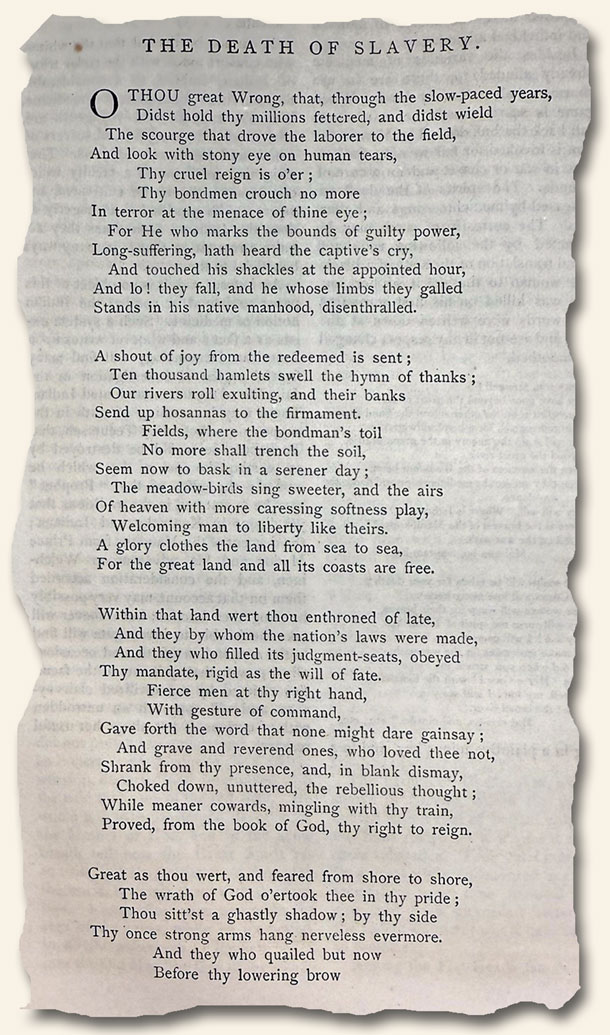
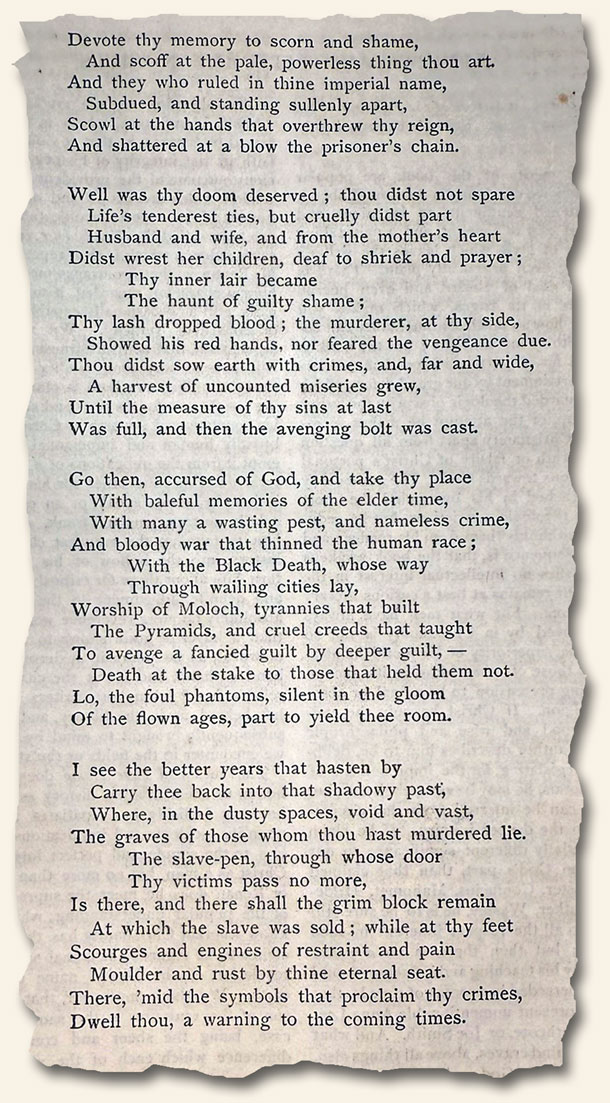
A “hidden gem” within a 1785 newspaper leads to discovery, inspiration, and a correction…
August 22, 2025 by GuyHeilenman · Leave a Comment
Just for fun, guess the author and approximate date the following “Address to America” was published:
“PEOPLE of North America! Let the example of all nations which have preceded you, and especially that of the mother country, instruct you. Be afraid of the influence of gold, which brings with luxury the corruption of manners and contempt of laws; be afraid of too unequal a distribution of riches, which shews a small number of citizens in wealth, and a great number in miser; whence arises the insolence of one, and the disgrace of the other, Guard against the spirit of conquest; the tranquility of the empire decreases as it is extended; have arms to defend yourselves, and have none to attack.
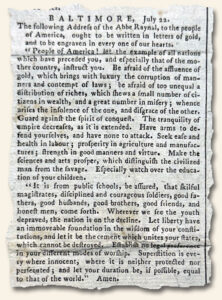 Seek ease and health in labour; prosperity, in agriculture and manufactures; strength, in good manners and virtue. Make the sciences and arts prosper, which distinguish the civilized man from the savage. Especially watch over the education of your children.
Seek ease and health in labour; prosperity, in agriculture and manufactures; strength, in good manners and virtue. Make the sciences and arts prosper, which distinguish the civilized man from the savage. Especially watch over the education of your children.
It is from public schools, be assured, that skillful magistrates, disciplined and courageous soldiers, good fathers, good husbands, good brothers, good friends, and honest men come forth. Wherever we see the youth depraved, that nation is on the decline. Let liberty have an immovable foundation in the wisdom of your contributions and let it be the cement which unites your states, which cannot be destroyed. Establish no legal preference in your different modes of worship. Superstition is every where innocent when it is neither protected nor persecuted; and let your duration be, if possible, equal to that of the world.”
I recently discovered this address on page 3 of The Independent Gazetteer; or, The Chronicle of Freedom dated July 30, 1785. After a bit of digging, in my humble opinion, a trek into the life of its author, Abbé Raynal, promises to not disappoint.
As for his “Address to America” itself, one cannot help but think his words fell on deaf ears. Sadly, even if we wanted to hit the reset button and start again while heeding his warnings, the last paragraph is problematic considering the current state of public education. However, as difficult as it would be to change course, status quo is obviously not an option.
As for the correction mentioned in the above heading for this post…
Multiple resources claim Abbé Raynal’s Address was first published posthumously (in 1800). It’s always fun when an old newspaper can prove the “experts wrong”.
A summary of the address using multiple AI resources is as follows:
Abbé Raynal’s “Address to America” is a powerful message written during the American Revolution in which the French Enlightenment thinker praises the American colonies for their fight for independence from British rule. He commends the courage of the revolutionaries and their commitment to liberty, viewing the struggle as a monumental step forward for human freedom. Raynal sees the revolution as a chance for a new nation to break from the oppressive traditions of Europe and create a society founded on justice, equality, and natural rights.
However, Raynal does not offer unconditional praise. He sharply criticizes the continued practice of slavery in the American colonies, pointing out the contradiction between fighting for freedom while denying it to enslaved people. He also expresses concern over the treatment of Indigenous peoples and warns the new republic against replicating the colonial abuses of European empires. His address is both a celebration of America’s potential and a moral challenge to align its actions with the ideals it professes.
The significance of Raynal’s message lies in its early and public call for America to confront its moral failings. His address exemplifies the Enlightenment belief that political freedom must be accompanied by social and ethical responsibility. By urging America to live up to its revolutionary ideals, Raynal’s words contributed to a broader conversation about liberty, justice, and the true meaning of independence—conversations that would shape not only American history but global ideas about human rights.
Americana at it’s best… The annual Egg Roll on the lawn of The White House…
April 20, 2025 by Laura Heilenman · Leave a Comment
 I apologize upfront for the fact that so many of my posts lean heavily on nostalgia. Truth be told, I often have to apologize to my kids for how quickly I tear up when I think of the past. Keeping my soft pot for the “good” of the past in mind, it will come as no surprise that I chose the following issue for today’s installment.
I apologize upfront for the fact that so many of my posts lean heavily on nostalgia. Truth be told, I often have to apologize to my kids for how quickly I tear up when I think of the past. Keeping my soft pot for the “good” of the past in mind, it will come as no surprise that I chose the following issue for today’s installment.
The FRANK LESLIE’S ILLUSTRATED for April 23, 1887 featured a delightful full-page illustration of the annual White House Egg Roll. Whoever the artist was (it was described as being from a “staff artist”), they perfectly captured the best of America in all its innocence and deep-felt sense of community. American traditions are part of our core essence as a unified people and they build bonds between us which help us stand firm during the hardships of life. Keep in mind, as Spring and Summer arrive, we are about to be flooded with National Holidays drenched with American traditions. Especially during the upcoming year, in light of our nation’s 250th birthday, may we all pause to appreciate the small but powerful traditions which help define us as Americans.

PS “Red and yellow back and white”… playing out in 1887 🙂
PPS As much as I get weepy when thinking about the past, I do find myself very misty-eyed at what I see and experience in my present as well. Perhaps I’m just a softie?!!




